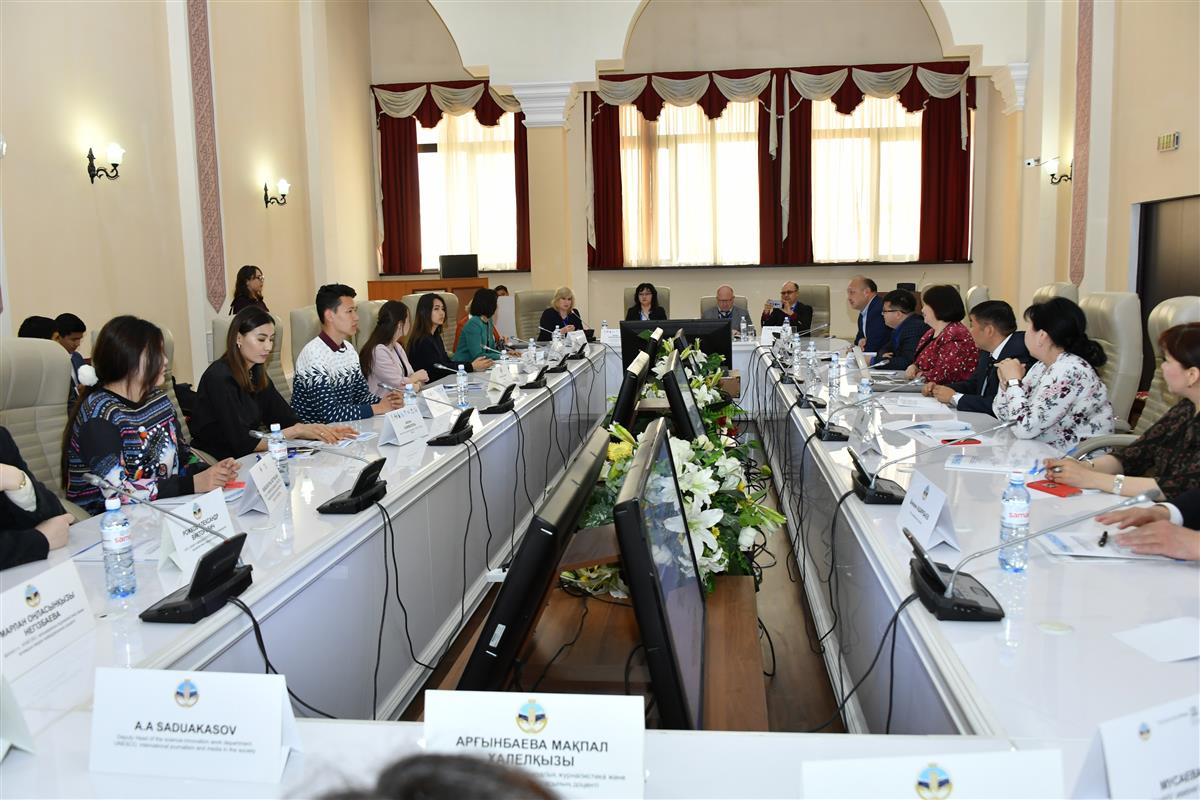International journalism: search for learning models
Views: 3255

The rapid development of information and communication technologies and the digital revolution require a fundamental change in the approach to training media professionals, in particular international journalists. The IV International Scientific and Practical Conference «Models of teaching international journalism for sustainable development» (MTIJ), which was held by the UNESCO Chair, International Journalism and Media in the Faculty of Journalism of the Al-Farabi Kazakh National University with the support of the UNESCO Cluster Office, was devoted to this topical issue. in Almaty. The different aspects of international journalism, which studies the legal norms of journalists and the media, covering the activities of international and regional organizations, were addressed by the speech of the Director of the UNESCO Almaty Cluster Office, Christa Pikkat, communication and information specialist of the Cluster Bureau, Sergey Karpov, pro-rector, Director of the Sustainable of the development of Ban Ki-moon Rafis Abazov, head of the department of UNESCO, international journalism and media in society, Professor N Azgul Shyngysovoy. There were also heard reports on such important areas of the conference as world standards of journalism education: technological trends and sustainable development; media edyuton: innovative format of new knowledge; international standards in domestic education; New horizons of the profession: the status of a journalist in Central Asia; media culture, MIG and information security; media environment: indicators of media and information literacy; new communication formats: ecology of thinking; features of media consumption of Kazakhstani youth in social networks; Crowdlearning: ideas and opportunities; sustainable development and civic journalism.
Of particular interest were the reports of the expert of the International Foundation for the Protection of Freedom of Speech «Adil Soz» Galiya Azhenova, Professor at the Faculty of Journalism of the Kazakh National University. Al-Farabi Lyayli Akhmetova and Professor of KIMEP Gulnara Asanbayeva. G. Asanbayeva, analyzing in detail the psychological aspects of modern information wars, noted that modern technologies, besides being forced to teach us, also brought such a massive phenomenon, it used to be, but now it's just massive - this is fake news. This increases the requirements for us as journalists, increases the requirements for our criticality, critical thinking. «This will be an important aspect in the future - I think that we will all be drowned in an avalanche of information, and our work as professionals will be in helping our readers,» the scientist concluded.
In the report of the author of these lines on training programs fairly new for Kazakhstan, the specialty of international journalism, it was emphasized that future international journalists should master the basics of diplomacy, know and understand the culture of the country in which they work, and understand the history of relations between the countries. Therefore, the program «International Journalism» of the Faculty of Journalism of the Kazakh National University. Al-Farabi trains specialists freely oriented in the theory and practice of modern world journalism. The program provides training for highly qualified journalists in international affairs - correspondents, reviewers, editors with knowledge and competencies that are in demand primarily for work in the media in Kazakhstan and in foreign countries. The acquired knowledge, skills and abilities allow graduates of the master's program to work as journalists in foreign media, in the departments of international editorial offices. Currently graduates of the master's program work in foreign and Kazakhstan print media, on television, radio broadcasting, in news agencies, online publications. In addition, graduates learn and related information and communication areas: they are employees of publishing houses, press services, advertising agencies and public relations agencies.
The curriculum of the program involves an in-depth study of current problems of international journalism: information processes, foreign policy propaganda, political analysis technologies, modern broadcasting, and convergent journalism. The program provides an opportunity to systematically study the organizational and economic forms, the specifics of the content and models of modern foreign media. Special attention is paid to the topic of international cooperation, the typology of publications and programs specializing in this information sphere, the characteristics of their audience, the working methods of the journalist who covers the problems of international cooperation, the specifics of genres and methods. A foreign language is also studied - a part of the professional cycle disciplines is taught in English.
The report noted that leading universities of the Russian Federation, as Moscow State University M.V.Lomonosov and MGIMO (University) under the Ministry of Foreign Affairs of the Russian Federation for half a century successfully conduct training of highly qualified specialists. It was proposed to study their pedagogical and scientifically-methodical experience to determine the ways of forming the domestic model of training international journalists.
Zh. Bekbolatuly,
professor of the Department
UNESCO, International Journalism
and media in society








